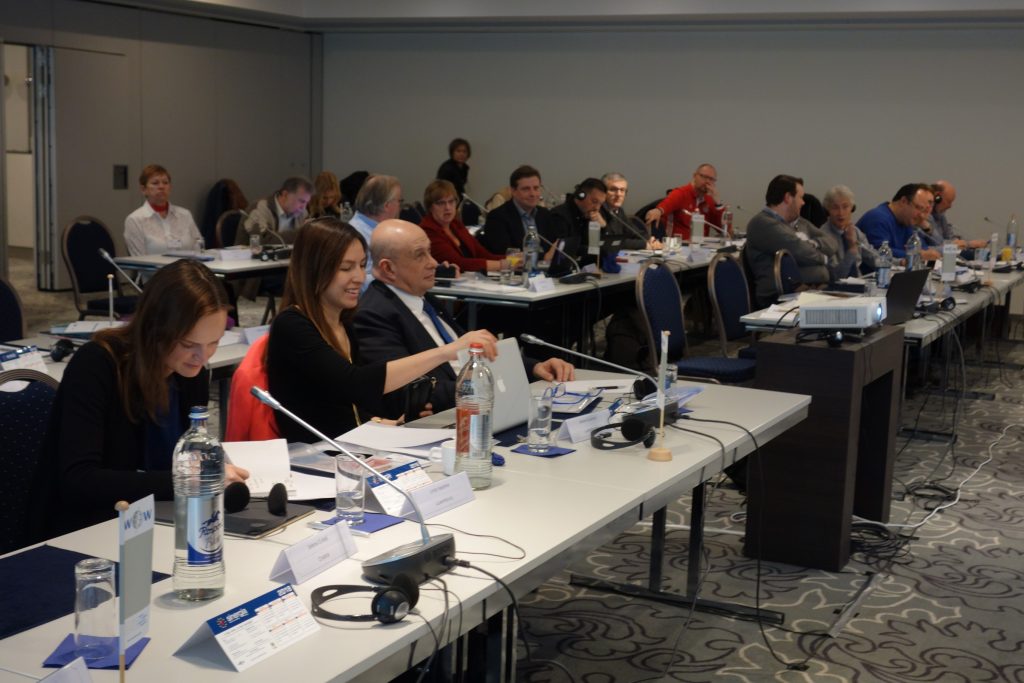From 05 – 07 February 2018 the Krifa and the World Organization of Workers (WOW) in cooperation with the European Centre for Workers’ Questions (EZA) and supported by the European Commission organized a seminar titled “A new working environment: Are flexible work-places effective?”. The seminar took place in Luxembourg.
Flexibility is a very topical word. Today more than ever flexibility is expected from both companies, employers and employees alike. Workplace flexibility can be understood in two different ways. The first is the flexibility at large, meaning that workers have flexible contracts and arrangements for work. The other form of flexibility at the workplace is the form where no employee has a fixed place of work.
The benefits of working flexibly are quite clear. And very often it is considered mostly a benefit for the employers (through reduction of costs, be these for office-space or reduction of travel-costs). Surely, the benefits for employees are numerous too. Being able to do work from home or elsewhere allows people more freedom in scheduling what is best for them. Of course depending on the type of job you do as well as the country one comes from.
But there are disadvantages too and there is increasingly more evidence for these. People more and more have the feeling that the work never stops being reachable all the time. They thus work more hours than stated in their contracts. Also, more people are suffering with signals of burn-out at an increasingly younger age. So enough food for thought.
Mr. Pat Cuffe, Human Resource Management Expert – Private and Public Sector Organisations, Dublin Institute of Technology primarily focused on the consideration that flexible work is only a benefit to employers. For a long period of time the manner of working has not evolved that much. This while the use of new ways of communication has. Internet has only been in real use since the eighties of the past century causing a revolution in communication. The world of work is still not fully ready for this. Companies and employers stick to how things have been done for so many years. Work and private life were very much divided. This has changed and despite the negative effects it also allows more flexibility. Whereas in the past years the discussion was about work-life-balance, the consideration should now more be like a work-life-relationship. People are not the same and the same can be said about when they are most productive. By giving space to these differences the results will eventually be better.
The second speaker, Mr. António Manuel Carita Franco, Vice-President Sindicato da Energia (Portugal) focussed on the situation regarding flexible work in his country. In Portugal flexible forms of employment are still not the standard, but it is growing. For many of those in flexible employment jobs this was never a choice. They just could not find other employment. As Mr. Franco stated: “There seems to be a mismatch between workers’ expectations and employment policies. Studies indicate that the expectations of most workers are about job stability, but the political and business environments are trying to impose flexible (especially precarious) forms.” This is a European-wide trend. There are numerous bogus-self-employed.
The situation in Germany is quite different. Here many people have flexible contracts and a large number of people work part-time. But what trends and challenges of flexible work in Germany are there. Mr. Torsten Brandt focused on three main items: company frameworks; flexible working hours; and the challenges for employers and employee representatives for those working from home. What can be seen is a general deterioration of protection of worker’s social rights. There is furthermore an increase in part-time jobs. Those people in these type of jobs have less say over their hours, location of work, and they experience much stress about their lack of rights. For those working from home it is clear that they often work more hours than they should, which can lead to self-exploitation. Proper frameworks are still missing. And this should change soon.
Ms. Dr. Heejung Chung from the University of Kent in her contribution ‘Flexible working: The way of the future?’ gave an introduction on how we came where we are today and what flexible work actually entails. Studies show that flexibility is an important factor for choosing a job. Studies also show that flexibility makes people more productive. It is true that we stick too much to the hours worked and not necessarily on how productive one is. Flexible and part-time working is considered a negative for gender-equality, because it enables traditional division of roles to continue. Although flexible is often regarded as the answer to a better work-life balance it is also a cause of work-family conflict. The boundaries between work and life become less clear. One is able to work always from anywhere. The assumption that workers will expand their leisure when given freedom is wrong (the autonomy paradox). Instead it allows people to work longer (than they would have otherwise). Proper regulations and laws are still missing. But these should be developed to protect workers at large.
The final speaker, Ms. Sabina Guerrero of The Job Tailors explained flexible work as an important part of the future of work. In Luxembourg flexible work is not evident. This while the country is suffering from problems such as congestion and pollution as a result of that. Luxembourg has a large foreign working-population entering and leaving the country daily. Most jobs are still nine to five. Many companies in Luxembourg are not yet ready for a flexible labour-market. This requires a change of mind-set. This while the overall opinion is that it is beneficial to both companies as workers. The Job Tailors is trying to further develop flexible work by showing the benefits and thus making it more popular.
After this last presentation four more contributions were made from four different countries showing large differences. Whereas flexible work in both Serbia and Macedonia was not very common this was very much the case in Denmark and the Netherlands. This is partly due to the types of jobs available, but also due to the fact that managers do not sufficiently trust the productivity of employees.
Trust is key when talking about flexible work arrangements. Managers should have trust in the sense of responsibility people themselves have. They too should change their mind-set by focusing less on hours and more on outcome. Workers will have to set boundaries in order for protecting themselves. Regulation is very important and will surely be adapted to the current situation. And companies will have to make sure that the company-culture remains intact. With many employees working from everywhere this is quite a challenge. But since the developments are more towards working flexibly than vice versa answers will have to be found.
for pictures click here





